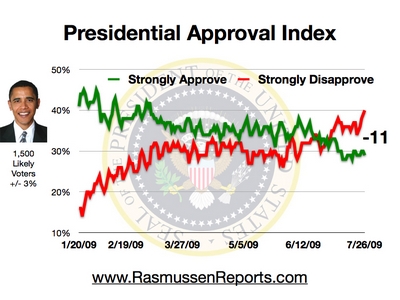I conducted an informal survey of friends and family over the last few days, most of whom voted for Obama and rank themselves supporters.
It seems that at least here in Massachusetts, there are quite a few regular people that "lost a lot of respect for Obama."

http://www.rasmussenreports.com/publ..._tracking_poll
I'd wager the recent evening off period of this index is over.
It seems that at least here in Massachusetts, there are quite a few regular people that "lost a lot of respect for Obama."

http://www.rasmussenreports.com/publ..._tracking_poll
I'd wager the recent evening off period of this index is over.
 "We have all been living in a climate of ’shoot (or accuse) first, ask questions later.’ And that attitude is contagious. … Prince George’s official county Web site defines itself as ‘a county of livable communities.’ That’s what we all wish for – a livable community, a home where we feel safe. We want to feel that if the bad guys come, we can call the police and they will be the good guys. We want to believe that if we’re innocent, armed men with government badges won’t handcuff us and shoot our pets and wave their weapons in our faces.
"We have all been living in a climate of ’shoot (or accuse) first, ask questions later.’ And that attitude is contagious. … Prince George’s official county Web site defines itself as ‘a county of livable communities.’ That’s what we all wish for – a livable community, a home where we feel safe. We want to feel that if the bad guys come, we can call the police and they will be the good guys. We want to believe that if we’re innocent, armed men with government badges won’t handcuff us and shoot our pets and wave their weapons in our faces. "There are no more checks and balances in these sorts of situations, and there need to be," charges Barr. "Public officials need not be afraid to say, yes, we respect our police, but they make mistakes and we need to look into this."
"There are no more checks and balances in these sorts of situations, and there need to be," charges Barr. "Public officials need not be afraid to say, yes, we respect our police, but they make mistakes and we need to look into this."
Comment